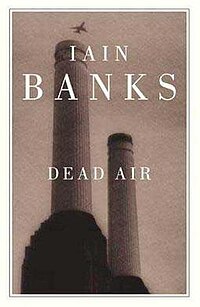
Iain Banks was a Scottish author, writing mainstream fiction as Iain Banks and science fiction as Iain M. Banks, adding the initial of his adopted middle name Menzies. After the success of The Wasp Factory (1984), he began to write full time. His first science fiction book, Consider Phlebas, appeared in 1987, marking the start of the Culture series. His books have been adapted for theatre, radio, and television. In 2008, The Times named Banks in their list of "The 50 greatest British writers since 1945".

The Angry Brigade was a far-left British terrorist group responsible for a series of bomb attacks in England between 1970 and 1972. Using small bombs, they targeted banks, embassies, a BBC Outside Broadcast vehicle, and the homes of Conservative Members of Parliament (MPs). In total, police attributed 25 bombings to the Angry Brigade. The bombings mostly caused property damage; one person was slightly injured. Of the eight people who stood trial, known as the Stoke Newington Eight, four were acquitted. John Barker, along with Hilary Creek, Anna Mendelssohn and Jim Greenfield, were convicted on majority verdicts, and sentenced to ten years. In a 2014 interview, Barker described the trial as political, but acknowledged that "they framed a guilty man".

The Wasp Factory is the first novel by Scottish writer Iain Banks, published in 1984. Before the publication of The Wasp Factory, Banks had written several science fiction novels that had not been accepted for publication. Banks decided to try a more mainstream novel in the hopes that it would be more readily accepted, and wrote about a psychopathic teenager living on a remote Scottish island. According to Banks, this allowed him to treat the story as something resembling science fiction – the island could be envisaged as a planet, and Frank, the protagonist, almost as an alien. Following the success of The Wasp Factory, Banks began to write full-time.

Henry Kenneth Alfred Russell was a British film director, known for his pioneering work in television and film and for his flamboyant and controversial style. His films were mainly liberal adaptations of existing texts, or biographies, notably of composers of the Romantic era. Russell began directing for the BBC, where he made creative adaptations of composers' lives which were unusual for the time. He also directed many feature films independently and for studios.

Alistair Charles McGowan is an English impressionist, comic, actor, singer and writer best known to British audiences for The Big Impression, which was, for four years, one of BBC1's top-rating comedy programmes – winning numerous awards, including a BAFTA in 2003. He has also worked extensively in theatre and appeared in the West End in Art, Cabaret, The Mikado and Little Shop of Horrors. As a television actor, he played the lead role in BBC1's Mayo. He wrote the play Timing and the book A Matter of Life and Death or How to Wean Your Man off Football with former comedy partner Ronni Ancona. He also provided voices for Spitting Image.
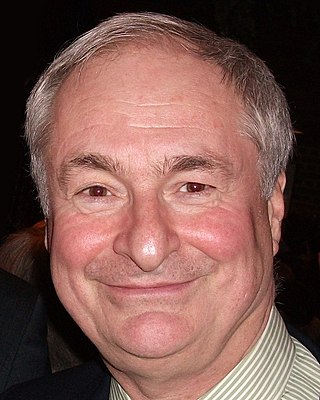
Paul Matthew Gambaccini is an American-British radio and television presenter and author in the United Kingdom. He has dual United States and British nationality, having become a British citizen in 2005.
Martin Sixsmith is a British author and radio/television presenter, primarily working for the BBC. He has also worked as an adviser to the Labour government and to the BBC television comedy series The Thick of It. Sixsmith's book about Philomena Lee, The Lost Child of Philomena Lee, was the basis for the 2013 film Philomena, in which Sixsmith is played by Steve Coogan.
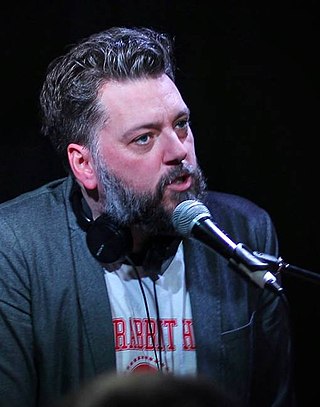
Iain Lee is an English former broadcaster, writer, and television presenter and stand-up comedian who hosts the phone-in talk show The Late Night Alternative on "pay to view" Patreon.

Sebastian Charles Faulks is a British novelist, journalist and broadcaster. He is best known for his historical novels set in France – The Girl at the Lion d'Or, Birdsong and Charlotte Gray. He has also published novels with a contemporary setting, most recently A Week in December (2009) and Paris Echo, (2018) and a James Bond continuation novel, Devil May Care (2008), as well as a continuation of P. G. Wodehouse's Jeeves series, Jeeves and the Wedding Bells (2013). He was a team captain on BBC Radio 4 literary quiz The Write Stuff.

Stuart John Maconie is an English radio DJ and television presenter, writer, journalist, and critic working in the field of pop music and popular culture. He is a presenter on BBC Radio 6 Music where, alongside Mark Radcliffe, he hosts its weekend breakfast show which broadcasts from the BBC's MediaCityUK in Salford. The pair previously presented an evening show on BBC Radio 2 and the weekday afternoon show for BBC Radio 6 Music.

Peter Mullan is a Scottish actor and filmmaker. He is best known for his role in Ken Loach's My Name Is Joe (1998), The Claim (2000), and all three series of the BBC comedy series Mum, in which he starred as Michael.

Iain Dale is a British broadcaster, author, political commentator, and a former publisher and book retailer. He has been a blogger since 2002. He was the publisher of the Total Politics magazine between 2008 and 2012, and the managing director of Biteback Publishing until May 2018. Since September 2010, he has hosted a regular discussion show on the radio station LBC. He was named Radio Presenter of the Year at the Arqiva Commercial Radio Awards in 2013 and 2016. On 28 May 2024, he announced that he was quitting his LBC roles to run as an MP in the 2024 United Kingdom general election, only to abandon his campaign three days later. He returned to his usual LBC slot on 3 June.
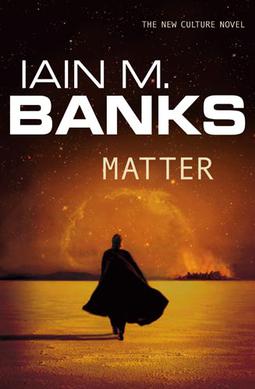
Matter is a science fiction novel from Iain M. Banks set in his Culture universe. It was published on 25 January 2008.
Iain Hollingshead is a British freelance journalist and novelist.
Chris Petit is an English novelist and filmmaker. During the 1970s he was Film Editor for Time Out and wrote in Melody Maker. His first film was the cult British road movie Radio On, while his 1982 film An Unsuitable Job for a Woman was entered into the 32nd Berlin International Film Festival. His films often have a strong element of psychogeography, and he has worked frequently with the writer Iain Sinclair. He has also written a number of novels, including Robinson (1993).
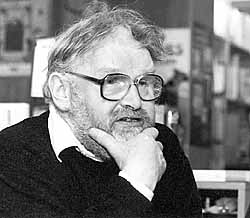
Alasdair James Gray was a Scottish writer and artist. His first novel, Lanark (1981), is seen as a landmark of Scottish fiction. He published novels, short stories, plays, poetry and translations, and wrote on politics and the history of English and Scots literature. His works of fiction combine realism, fantasy, and science fiction with the use of his own typography and illustrations, and won several awards.
The Culture series is a science fiction series written by Scottish author Iain M. Banks and released from 1987 through to 2012. The stories centre on The Culture, a utopian, post-scarcity space society of humanoid aliens, and advanced superintelligent artificial intelligences living in artificial habitats spread across the Milky Way galaxy. The main themes of the series are the dilemmas that an idealistic, more-advanced civilization faces in dealing with smaller, less-advanced civilizations that do not share its ideals, and whose behaviour it sometimes finds barbaric. In some of the stories, action takes place mainly in non-Culture environments, and the leading characters are often on the fringes of the Culture, sometimes acting as agents of Culture in its plans to civilize the galaxy. Each novel is a self-contained story with new characters, although reference is occasionally made to the events of previous novels.

The Hydrogen Sonata is a science fiction novel by Scottish author Iain M. Banks, set in his techno-utopian Culture universe. The hardcover edition was released on 4 October 2012 in the United Kingdom, and on 9 October in the United States. The book's release marked 25 years since the publication of Banks' first Culture novel. A paperback edition of the book was released on 5 September 2013 in the United Kingdom, and on 10 September in the United States. The Hydrogen Sonata was Banks' last science fiction novel, as he died of gall bladder cancer in June 2013.
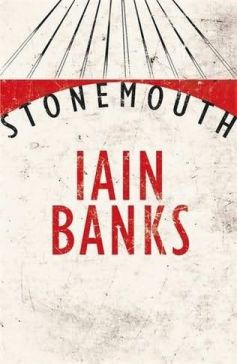
Stonemouth is a 2012 novel by Scottish author Iain Banks. The novel was published on 5 April 2012 by Little, Brown and Company and follows a man returning to a small seaport town after being forced to flee five years earlier. The Irish Times picked the book as one of their "Books to Read in 2012".

Jack Taylor is an Irish mystery television drama based on the novels by Ken Bruen. Set in Galway, it features Iain Glen in the eponymous role of Jack Taylor, a former officer with the Garda Síochána who becomes a "finder" after leaving the service; Taylor looks for clues others have overlooked, and knows the streets of his hometown like the back of his hand.
